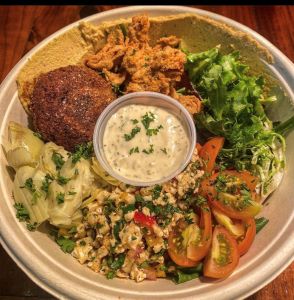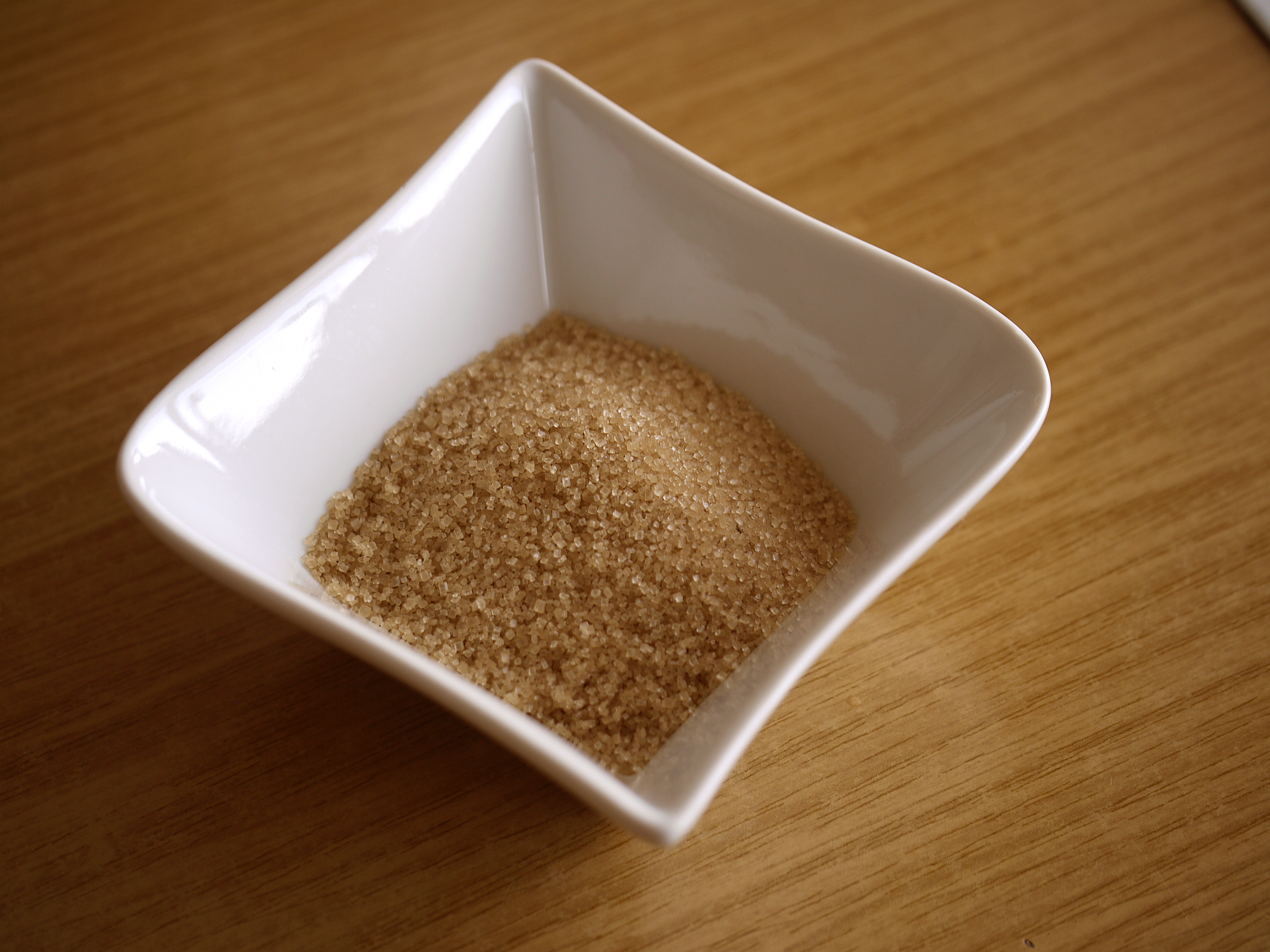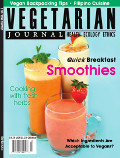Posted on
September 02, 2024 by
The VRG Blog Editor

photo from Roasted and Raw
The Vegetarian Resource Group maintains an online Guide to Vegan/Vegetarian Restaurants in the USA and Canada. Here are some recent vegan restaurant additions. The entire guide can be found here: www.vrg.org/restaurant
To support the updating of this online restaurant guide, please donate at: www.vrg.org/donate
Here are some new additions to VRG’s guide:
Bar Vegan, 706 Grayson Hwy., Lawrenceville, GA 30045
Bar Vegan approaches vegan cuisine with “fun and flare.” A couple of their Starters are Street Corn, caramelized on the cob, coated with cilantro lime aioli, parmezan, ancho chili flakes, fresh cilantro, and lime, or lightly charred Maple Glazed Brussel Sprouts with house-made sriracha agave sauce, topped with toasted sesame seeds and lime. Main dishess include Cheezesteak Combo, a classic Philly sandwich made with your choice of protein, sautéed with onions, mushrooms, bell and banana peppers; Boneless Chik’n Wings–tenders tossed in either bourbon, lemon pepper, or buffalo sauce with homemade vegan ranch; or Chef’s Choice Spaghetti with Bar Vegan’s house-made marinara of onions, mushrooms, bell peppers, and fresh grated parmesan to name a few Main dishes. For Kids there’s Beyond Chick’n Tenders and Fries or Beyond Cheezeburger and Fries. Saturday and Sunday Brunch offers Shrimp ‘N Grits–Nashville hot tossed vegan shrimp and roasted garlic cheeze grits topped with micro greens; French Toast–Red velvet baguette, strawberries, and candied pecans with cream cheeze anglaís; and Seasonal Pancakes featuring Chef’s choice with warm maple syrup. Sweets include The Booze Brownie, a warm fudge brownie topped with Hennessey ice cream and agave drizzle, or Home Wrecker, a fried sweet potato in cinnamon sugar, topped with cream glaze, powdered sugar, and a side of peach jam.
Bunk House Coffee Bar, 236 S. US Hwy. 1, Tequesta, FL 33469 and 3181 NE West End Blvd., Jensen Beach, FL 34957
100% plant based and mostly gluten-free food, baked goods, and beverages. They have a variety of “Smoothie Bowls” and “Food/Snacks” including a Bagel Sandwich (JUST Egg, Tomato, Spinach, Guacamole, Cream Cheese, and Salt & Pepper on a Toasted Everything Bagel), Breakfast Sandwich (JUST Egg, Beyond Sausage, Spinach, Tomato, and Spicy Chipotle Mayo on a Toasted English Muffin), Chia Pudding, and a Fruit Bowl. Also Breakfast Smoothies and Mylkshakes. Baked goods vary from day to day but include Carrot Cake Cupcake.
Daylily Coffee Shop, 912 N. Fremont St., Portland, OR 97227
Seven breakfast items, all of which come on an English muffin and are 100% vegan, including No. 1 (Just Egg, Cheese, Arugula, and Garlic-Aioli) and No. 4 (Peanut Butter and Jam) and Breakfast Burrito (Tofu Scramble, Black Beans, Potatoes, and Salsa). Lunch includes Mediterranean Wrap (Seasoned Soy Curls, Hummus, Romaine, Kalamata Olives, Red Onions, Red Peppers, Tortilla, Tahini Dressing) and Thai Chick’n Wrap (Seasoned Soy Curls, Red Onion, Shredded Carrots, Red Peppers, Romaine, Thai Peanut Dressing, Tortilla). Smoothies include Peanut Butter Banana, Kale Mango, and Ginger Berry.
Feral, 1640 NE Killingsworth St., Portland, OR 97211
Community oriented, one of Feral’s core values is having all their guests feel safe and welcome. They endeavor to respect the environment by employing techniques which leave as little waste as possible. While they aim to accommodate dietary restrictions, please see their FAQs for details. They collaborate with women owned businesses and local farmers to offer vegetable focused fare. Their menu reflects an ever evolving perspective, changing frequently to optimize seasonality. Here are some examples of dishes on the menu when this was written: Plum Barbecued Summer Chanterelles and Grits glazed with guajillo chili pepper and plum barbecue sauce, grilled zucchini, creamy grits, porcini jus, tomatillo salsa and cilantro; Country Fried Lion’s Mane–cornmeal-battered, served with blueberry, gochugaru (a sun dried chili powder with smoky, fruity, slightly sweet heat), koji sofrito, and vegetable salad in an herby, basil vinaigrette; Fettuccini with Eggplant and Chestnut Mushroom featuring eggplant cream, cherry tomato conserva, and fresh basil; Peaches and Cream marinated in ginger and lemongrass green tea with caramelized shallots, mint, calendula, fresh Jimmy Nardello (sweet, mild, fruity peppers) and aerated, fermented cashew; as well as Whipped Tofu and Cucumber Tartine featuring Ota tofu pate, black garlic skin and Za’atar (a savory Middle Eastern spice blend). That’s just a sample of some of their creative techniques and flavor combinations. Examples of Dessert possibilities include Spruce Tip Crème Brulée with Huckleberry balsamic syrup or mixed Stone Fruit and Cherry Scoop which chimes nicely on the tongue with vanilla ice cream, red wine cherry syrup and fresh bay oil. Though not required, reservations (via their Home Page) are highly recommended. Children are allowed until 8PM.
Roasted and Raw, 607 14th St., Oakland, CA 94612
Serves Burgers & Wraps, House Pastas, Bowls, and Sides. Most popular items are: Vallejo Burrito (Onions, Peppers, Yucca Fries, Stewed Black Beans & Rice, Avocado, Lettuce, Pico de Gallo, Cheddar, Sour Cream); Orange Teriyaki Wok Stir-Fry (A Premixed Array of Wok Veggies: Broccoli, Carrots, Onions, Bok Choy); Mac & Cheese (Glazed Sweet Potatoes, Garlicky Broccoli); Curry Chickpea Ragout Bowl (Hearty Curry Stew with Chickpeas, Cast Iron Veggies, Served with Glazed Sweets and Wok Baby Kale). Sample House Pastas are Bolognese with Fettuccini, Rotini (Fettuccini or Rotini Pasta, Sautéed Veggies, House Walnut Chorizo, Hearty Marinara Sauce, Parmesan, served with Crusty Garlic Bread) and Kelp Noodle Pad Thai (Cucumber, Carrots, Red Pepper, Mint, Basil, Sweet Chili, Peanuts, Served with Crusty Garlic Bread).
The Sleazy Vegan, 134 Main St., Suncook, NH 03275
The Sleazy Vegan Food Truck (so named because it “gets around”) serves daily from its permanent location in Durham, but is known to travel to a variety of other locales around southeastern New Hampshire. (The street address, hours, and service type here refer to its dine-in location at Pembroke City Limits, just north of the river in Suncook.) Its menu changes regularly, but some frequently offered favorites are the signature SVFT Burger, Sausage Hoagie, and Mexican-inspired breakfast foods.
Vegan Van, 3900 Elati St., Denver, CO 80216
Pizza lovers listen up! First Fridays of the month, Vegan Van hosts an All You Can Eat Pizza Party and Movie night, complete with unlimited “scratch made” vegan pizza, wings and salad, as well as board games and music! 8″ Pizza is also available. Besides Cheese and Margherita, there’s Mushroom Pesto with mozzarella, red onion and sausage, or BBQ Chicken Pizza with BBQ sauce, red onions, mozzarella, pineapple, chicken, cilantro, and more. They serve Wraps, Sandwiches, Burritos, and Tacos too. Some examples include Buffalo Caesar Wrap—crispy buffalo tofu, greens, sunflower seeds, coconut bacon, walnut parmesan and Caesar dressing, Chorizo, Egg & Cheese Breakfast Burrito with tater tots, JUST Egg scramble, seitan chorizo, cheddar cheese, kale, and green chile in a flour tortilla and a Crunchwrap of refried beans, seasoned seitan beef, nacho cheese sauce, lettuce, tomatoes, sour cream, and a crispy fresh tostada shell wrapped in a grilled flour tortilla, to note a few. Vegan Van takes their Pizza seriously—as in Dessert Pizza! Chocolate Chip Cookie Dough Pizza boasts chocolate chip cookie dough, white and dark chocolate chips, and chocolate sauce on their signature pizza dough with cinnamon sugar butter. There are also two rotating Cookie varieties—S’mores and Walnut Fudge for instance.



